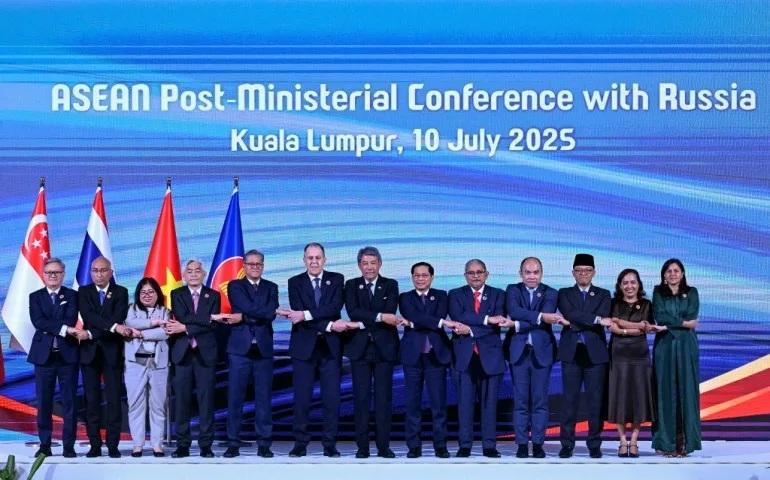China has pledged to sign a key Southeast Asian treaty that prohibits nuclear weapons in the region, signaling its commitment to regional peace and cooperation as tensions mount over impending U.S. tariffs on several ASEAN countries.
The confirmation came during the Association of Southeast Asian Nations (ASEAN) foreign ministers’ meeting in Kuala Lumpur on Thursday, July 10, 2025.
Malaysian Foreign Minister Mohamad Hasan announced that China had agreed, without conditions, to join the Southeast Asian Nuclear Weapon-Free Zone (SEANWFZ) treaty.
This is reportedly an agreement that has been in effect since 1997 and prohibits nuclear activities in the region except for peaceful purposes, such as energy production.
“China made a commitment to ensure they will sign the treaty without reservation,” Hasan said.
He added that the official signing will proceed once all required paperwork is finalized.
ASEAN has long urged the five recognized nuclear powers – China, the United States, Russia, France, and the United Kingdom – to endorse the pact and honor the region’s non-nuclear status, including within its exclusive economic zones.
Beijing had previously expressed willingness to back the treaty, positioning itself as a leader among nuclear-armed nations.
The move comes as part of a broader diplomatic push by China to solidify influence in Southeast Asia, especially as regional nations weigh their options amid growing geopolitical friction.
Tensions have escalated with the United States following President Donald Trump’s announcement of sweeping tariffs set to take effect August 1.
These include punitive duties of 25% on Malaysia, 32% on Indonesia, and up to 40% on Laos and Myanmar.
Other U.S. allies like Japan and South Korea are also facing similar tariffs, while Australia faces threats of a 200% levy on pharmaceutical exports.
Only Vietnam and the United Kingdom have secured separate trade agreements with Washington.
Vietnam, for instance, reached a deal that lowers its expected tariff to 20%, but also includes strict controls to prevent third-country transshipments.
Trump said Vietnam would, in turn, accept U.S. goods at zero percent tariff.
In the face of these economic pressures, ASEAN countries are increasingly looking to diversify their trade ties, chiefly toward China.
“These tariffs have provided an impetus for ASEAN nations to strengthen commercial relationships beyond the U.S.,” reported Al Jazeera’s Rob McBride from Kuala Lumpur.
He noted that ASEAN is becoming a focal point of global diplomatic competition.
China’s Foreign Minister Wang Yi has been actively engaging ASEAN officials in Kuala Lumpur, emphasizing Beijing’s commitment to regional stability and economic collaboration.
Concurrently, Russian Foreign Minister Sergey Lavrov is also present, promoting a “multipolar world order.”
This is reportedly an alternative framework to the U.S.-led global system, strongly endorsed by both Russia and China.
“While Lavrov might be sidelined elsewhere, here in Malaysia he is being welcomed,” McBride observed.
“He’s meeting with ASEAN leaders and advocating a different kind of global order.”
Meanwhile, U.S. Secretary of State Marco Rubio is on his first visit to Asia in his new role, tasked with restoring trust in America’s Indo-Pacific engagement after years of shifting focus to other global hotspots.
Rubio’s challenge lies in reassuring ASEAN members, many of whom are long-standing allies, that Washington remains committed despite recent economic policies that have caused uncertainty.
“Rubio is here to tell them the U.S. is still a dependable partner,” McBride said.
“But the region remains wary of the Trump administration’s unpredictability, especially on trade.”
A draft communiqué obtained by Reuters reflects regional unease, stating that ASEAN ministers are “concerned over rising global trade tensions and the uncertainties they create, particularly regarding unilateral tariff actions.”
In another draft statement seen by AFP, ASEAN, along with China, Russia, and the U.S., plans to issue a unified condemnation of violence against civilians in Myanmar.
In Myanmar, a civil war has raged since a 2021 military coup.
ASEAN has taken the lead in diplomatic efforts to address the ongoing crisis.
As global powers jockey for influence, Southeast Asia finds itself increasingly central to the shaping of a new international order.
The region’s ability to navigate these rivalries could have profound implications for global diplomacy and economic alignment in the years ahead.







